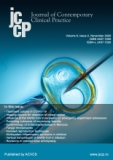One-stage vs. two-stage revision outcomes in infected total knee arthroplasty
One-stage vs. two-stage revision outcomes in infected total knee arthroplasty
Author(s): Mihai Colțan, Șerban DragosloveanuSubject(s): Review, Health and medicine and law, Present Times (2010 - today)
Published by: Asociația pentru Creșterea Vizibilității Cercetării Științifice (ACVCS)
Keywords: One-stage revision; two-stage revision; KSS score; HSS score; reinfection rate;
Summary/Abstract: Introduction During the past few years there has been an increase in the number of one-stage interventions for the septic revisions of the total knee and total hip replacement prosthetics, even though the most frequently used method in these situations remains the two-stage revision. The objective of this review is to identify and analyze data from field literature regarding the outcomes of these two techniques. Review The results were similar, with a mid-value of 12.8% (range 0-33%) reinfection rate in one-stage and a mid-value of 14.6% (range 0-42%) reinfection rate in two-stage revision. A fixed spacer was used in 31.7% of cases with two-stage revision and an articulating spacer in 68.3% of cases. The functional results were similar, with a KSS score of 80 for the one-stage revision, and of 78 for the two-stage revision. The knee joint mobility was higher after the two-stage revision. The reinfection rate was 23% for the fixed spacer and 8% for the articulating one. Regarding the post-operative functional score, this was similar for both techniques. For the one-stage revision, the KSS score values were between 72 and 88 with a mid-value of 80 and for the two-stage revision the KSS score was between 64 and 86 with a mid-value of 78. Conclusions Our data supports the use of single stage revision for periprosthetic knee infection, in carefully selected patients, as an alternative to a two-stage procedure. In these cases, the one-stage procedure was associated with a similar reinfection rate and similar functional outcomes as the two-stage. The one-stage revision reduces the hospitalization, the cost and more important the patient’s surgery stress.
Journal: Journal of Contemporary Clinical Practice
- Issue Year: 6/2020
- Issue No: 2
- Page Range: 115-118
- Page Count: 4
- Language: English

